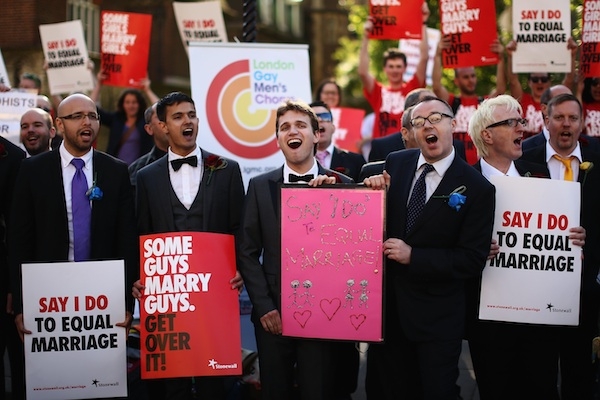As the House of Lords prepares to vote on gay marriage, a YouGov poll shows that the opinion of people who regard themselves as ‘religious’ is 48pc against and 44pc in favour of gay marriage. Given the margin of error, this can be seen as an even split. So why the acrimony?
The answer, in my opinion, is the way that David Cameron has gone about this. He ought to have said something like:
‘I’m in favour of religious freedom, and think it should be absolute. It’s come to our attention that some liberal strands of Judaism and Unitarian churches want to conduct same-sex marriage ceremonies but are banned from doing so by the government. The state ought to have no role in religious affairs, so I’m lifting the ban.’
He could have presented this (as Tony Blair did) as an almost technocratic reform.
Instead, the Tory leadership has decided to fight a US-style culture war, drawing a dividing line and putting themselves on one side of it and billing this as a battle of progress vs reaction. It was as if Cameron wanted to re-enact a battle fought and won by Tony Blair in 2004. This could be done because Blair did not want to pose as the Emily Pankhurst of gay rights, and bang on about how his Civil Partnerships Act was historic watershed moment. It certainly was, but Blair did not want to ham it up because – in this instance – he wanted to change things more than be seen to change them. With Cameron, it’s the reverse. Blair knew that for a certain generation of voters (brought up when homosexual activity was illegal) the pace of change in social attitudes was utterly bewildering. He didn’t see the point in rubbing his reform in anyone’s nose. What’s more, Blair did not want to make out as if he was imposing a civic orthodoxy: that gay marriage is right, and those who oppose it are morally wrong.
Cameron has gone about as if he is imposing a civic orthodoxy. This is the language of US-style culture wars. It’s funny to think that the coalition’s bill conveys not one single new right on single-sex couples. In the US, this battle is about rights that straight couples have but gay couples do not. In Britain, it’s about one word: marriage. Or, more accurately, it’s about the brand positioning of political parties.
Of course religious leaders would be opposed: gay marriage is opposed by almost every religion in the world. It’s to Cameron’s discredit that his (fairly insignificant) Bill has created far more bad blood and acrimony than Blair’s groundbreaking Civil Partnerships Act did.
The results of the poll (conducted by Centreground Political Communications, a campaign consultancy) are not surprising. Many religious people will believe that others, with a different world view, should also be free to live life as they choose. It is possible to simultaneously believe a) that homosexuality is morally wrong but b) those with a different set of values should be free to do what they want. There was never any need to set one side against the other. There is a quiet consensus here, which is why Cameron’s culture war was so unnecessary.
And has it helped the Tory brand? The party will, yet again, look like idiots when this debate is ignited again. I hope the lesson Cameron draws from this is not to fight US-style culture wars in the future, and not to whip up division in a country which has a good claim to be the most tolerant on earth.
PS. Polling religious people is notoriously difficult (as Anthony Wells outlined here) – there’s a big difference, for example, between practising and non-practising. I’ll link to the full YouGov data when it is published.







Comments